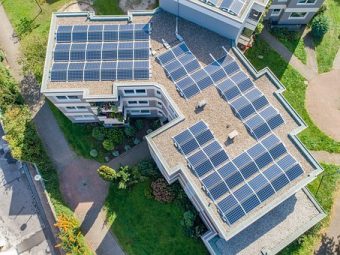
The European Bank for Reconstruction and Development (EBRD) is launching its own Energy Compact to support the energy transition, focussed on investments within its flagship urban sustainability programme, EBRD Green Cities. The Compact is a response to the United Nations’ Sustainable Development Goal (SDG) 7, which aims to provide clean and affordable energy for all.
Under this pledge, the EBRD commits itself to almost double investments in EBRD Green Cities’ priority investments to around EUR 1.9 billion by end-2023 from EUR 1,011 million as of August 2021. In the same period, the number of Green City Action Plans – the plans each city draws up after joining the programme, identifying priority environmental issues to address – is to rise to 50 from 19 currently completed.
On Friday in New York, the UN is hosting a High-Level Dialogue on Energy, whose outcomes will include a global roadmap towards the achievements of SDG 7 by 2030 and net zero emissions by 2050, as well as a series of Energy Compacts from member states and non-state actors such as the EBRD. The Dialogue is preceded by three days of multi-stakeholder pre-summit events.
Nandita Parshad, Managing Director, Sustainable Infrastructure Group, EBRD, announced the EBRD Energy Compact for Green Cities at a Wednesday event and stressed the importance of the focus on energy:
“When it comes to addressing the climate emergency, cities must be front and centre: they account for over 70 percent of global emissions, and the megatrend towards urbanization especially in the developing world, will place even more focus – quite rightly so – on the need for clean air, decarbonised urban transportation, and green and reliable energy access for all.”
More:
With cities growing but their leaders aware of the need to slow the pace of climate change, a key task for planners is to work out how to provide energy to expanding urban populations without aggravating climate problems or worsening air quality. This applies particularly to cities around the EBRD regions – central and eastern Europe, Central Asia, and the southern and eastern Mediterranean. The numerous challenges they face include insufficient infrastructure investment, demographic changes and poor air quality, all linked to a historical legacy of high energy and carbon intensity.
Solving these problems in a multi-faceted way was the inspiration behind the EBRD Green Cities programme, set up in 2016, which aims to help cities identify, prioritise and tackle these urban challenges to create more sustainable living spaces. It has proved so popular that, in its first five years, it has grown to include 49 cities.
The EBRD Energy Compact is based on the flagship EBRD Green Cities programme designed to introduce bottom-up planning through Green Cities Action Plans for green priority investments for cities. These include planning and financing aimed at forwarding SDG7, such as improving energy efficiency in buildings, supporting green urban mobility, water, waste management and digitalisation of city services.
The annual impact of Green Cities investments already translates into significant energy savings, estimated to be 2.4 million Gigajoules annually.
Source: EBRD



